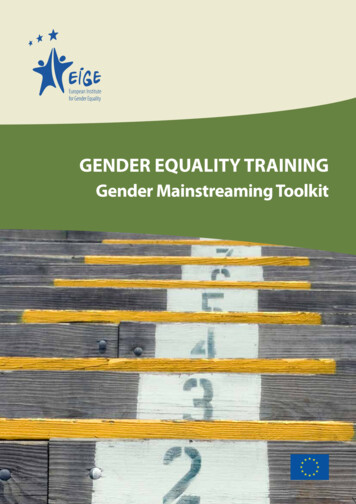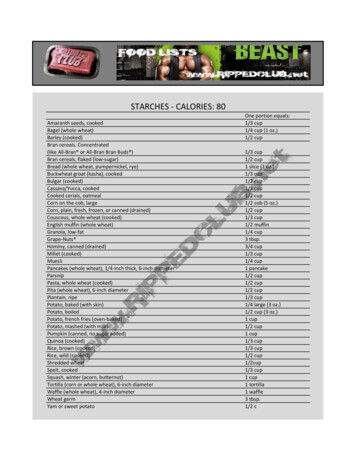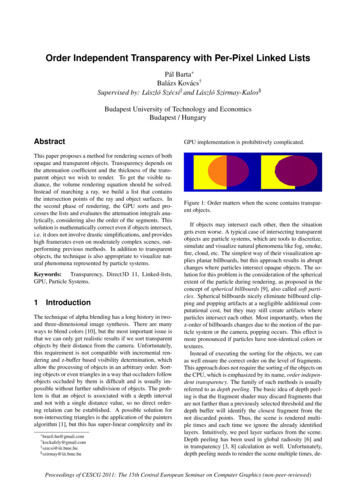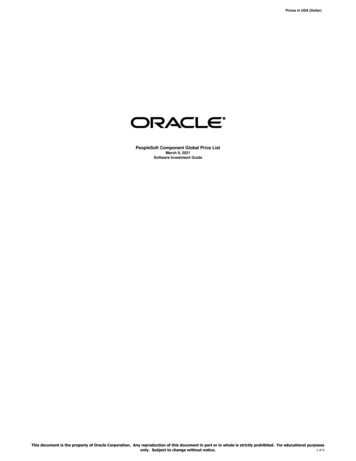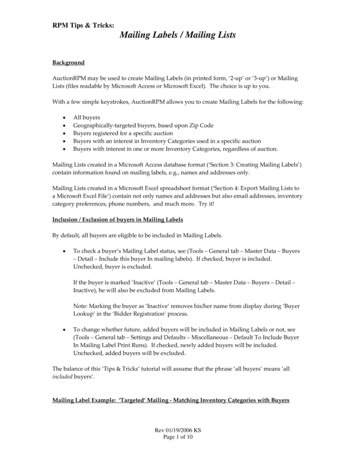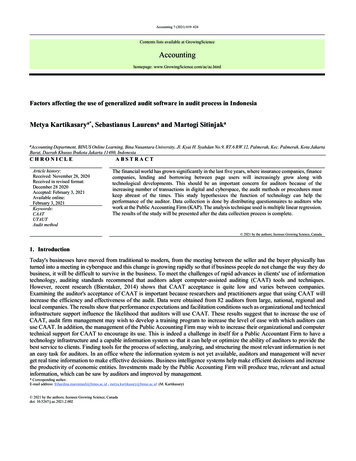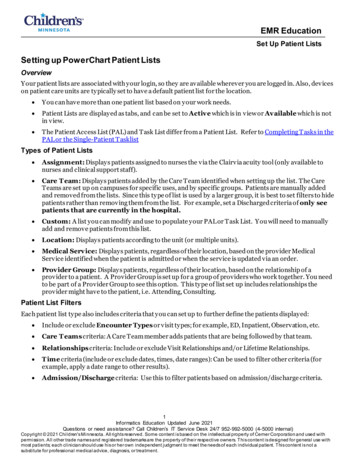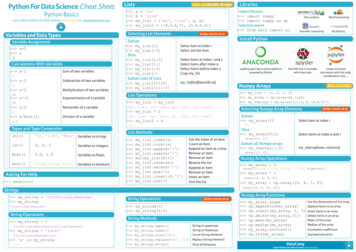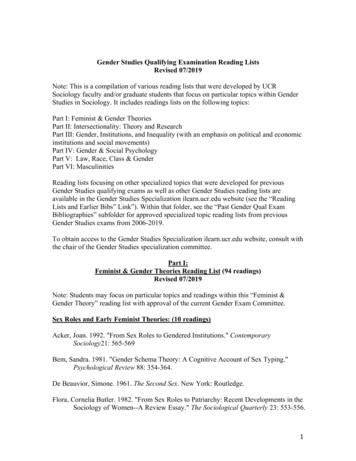
Transcription
Gender Studies Qualifying Examination Reading ListsRevised 07/2019Note: This is a compilation of various reading lists that were developed by UCRSociology faculty and/or graduate students that focus on particular topics within GenderStudies in Sociology. It includes readings lists on the following topics:Part I: Feminist & Gender TheoriesPart II: Intersectionality: Theory and ResearchPart III: Gender, Institutions, and Inequality (with an emphasis on political and economicinstitutions and social movements)Part IV: Gender & Social PsychologyPart V: Law, Race, Class & GenderPart VI: MasculinitiesReading lists focusing on other specialized topics that were developed for previousGender Studies qualifying exams as well as other Gender Studies reading lists areavailable in the Gender Studies Specialization ilearn.ucr.edu website (see the “ReadingLists and Earlier Bibs” Link”). Within that folder, see the “Past Gender Qual ExamBibliographies” subfolder for approved specialized topic reading lists from previousGender Studies exams from 2006-2019.To obtain access to the Gender Studies Specialization ilearn.ucr.edu website, consult withthe chair of the Gender Studies specialization committee.Part I:Feminist & Gender Theories Reading List (94 readings)Revised 07/2019Note: Students may focus on particular topics and readings within this “Feminist &Gender Theory” reading list with approval of the current Gender Exam Committee.Sex Roles and Early Feminist Theories: (10 readings)Acker, Joan. 1992. "From Sex Roles to Gendered Institutions." ContemporarySociology21: 565-569Bem, Sandra. 1981. "Gender Schema Theory: A Cognitive Account of Sex Typing."Psychological Review 88: 354-364.De Beauvior, Simone. 1961. The Second Sex. New York: Routledge.Flora, Cornelia Butler. 1982. "From Sex Roles to Patriarchy: Recent Developments in theSociology of Women--A Review Essay." The Sociological Quarterly 23: 553-556.1
Hochschild, Arlie. 1973. "A Review of Sex Roles Research." American Journal ofSociology 78: 1011-1029.Komarovsky, Mirra. 1945. "Cultural Contradictions of Sex Roles." American Journal ofSociology 52:184-189.Komarovsky, Mirra 1950. "Functional Analyses of Sex Roles." American SociologicalReview 15: 508-516.Lopata, Helen Z., and Barrie Thorne. 1978. "On the Term Sex Roles." Signs 3: 718-721.Nicholson, Linda. (Ed.) 1997. The Second Wave: A Reader in Feminist Theory. NewYork: Routledge.Parsons, Talcott. 1942. "Age and Sex in the Social Structure of the United States."American Sociological Review 7:604-616.Stacey, Judith and Barrie Thorne. 1985. “The Missing Feminist Revolution in Sociology.”Social Problems 32(4): 301-316.Intersectionality (13 Readings)Joan Acker 2006. “Inequality Regimes: Gender, Class, and Race in Organizations.”Gender &Society 20: 441-464.Baca Zinn, Maxine and Bonnie Thornton Dill “Theorizing Difference from MultiracialFeminism” Pp. 23-31Browne, Irene and Joya Misra. 2003. "The Intersection of Gender and Race in the LaborMarket." Annual Review of Sociology 29: 487-513.Cho, Sumi, Kimberle Williams Crenshaw, and Leslie McCall. 2013. “Toward a field ofintersectionality studies: Theory, applications, and praxis.” Signs 38: 1-26.Collins, Patricia Hill. 1986. "Learning from the Outsider Within: The SociologicalSignificance of Black Feminist Thought." Social Problems 33: S14-S32.Collins, Patricia Hill. 2000. Black Feminist Thought. Boston, MA: Unwin Hyman.Collins, Patricia Hill & Bilge, S. 2016. Intersectionality. MA: Polity Press.Combahee River Collective. 1977. “A Black Feminist Standpoint” pp. 63-70.2
Crenshaw, Kimberle Williams. 1993. "Mapping the Margins: Intersectionality, IdentityPolitics, and Violence Against Women of Color." Stanford Law Review 43:12411299.Harris, Angela P. 1993. "Race and Essentialism in Feminist Legal Theory." in FeministLegal Theory: Foundations, edited by D. K. Weisberg. Philadelphia, PA:Temple University Press.McCall, Leslie. 2005. “The Complexity of Intersectionality.” Signs 30(3): 1771-1800.Pyke, Karen D. and Denise L. Johnson. 2003. "Asian American Women And RacializedFemininities: “Doing” Gender across Cultural Worlds." Gender & Society 17:3353.Sandoval, Chela. 1991. "U.S. Third World Feminism: The Theory and Method ofOppositional Consciousness in the Postmodern World." Gender & Society 10: 124.Third World/Post-Colonial Feminisms (5 readings; see also the 2 Mohanty readingsbelow):Kandiyoti, Deniz. 1988. "Bargaining with Patriarchy." Gender & Society 2: 274-290.Ong, Aihwa. 1988. "Colonialism and Modernity: Feminist Representations of Women inNon-Western Societies." Inscriptions 3: 79-93.Narayan, Uma. 1997. "Contesting Cultures: 'Westernization,' Respect for Cultures, andThird World Feminists." in The Second Wave: A Reader in Feminist Theory,edited by L. Nicholson. New York: Routledge.Narayan, Uma. 2000. "Undoing the 'Package Picture' of Cultures." Signs 25: 1083-1086.Spivak, Gayatri Chakravory, “Can the Sub-Altern Speak?” in Social Theory: TheMulticultural and Classic Readings, edited by Charles Lemert. Boulder, CO:Westview Press.Social Constructionist & ‘Doing Gender Approaches (Using/Critiquing Insightsfrom Symbolic Interactionism, Ethnomethodology & Goffman) (12 readings)Garfinkel, Harold. 1967. "Agnes." in Studies in Ethnomethodology. Englewood Cliffs,NJ: Prentice-Hall.Gender & Society [Multiple Authors]. Symposium on “West and Zimmerman’s ‘DoingGender.’” Gender & Society 23(1): 72-122.3
Goffman, Erving. 1977. "The Arrangement Between the Sexes." Theory & Society 4:301-311.Lucal, Betsy. 1999. “What it Means to be Gendered Me.” Gender & Society13(6): 781-797.Goffman, Erving. 1977. "The Arrangement Between the Sexes." Theory & Society 4:301-311.Jenness, Valerie and Sarah Fenstermaker. 2014. “Agnes Goes to Prison: GenderAuthenticity, Transgender Inmates in Prisons for Men, and the Pursuit of‘The Real Deal’.” Gender & Society 28(1):5-31.Pyke, Karen D. and Denise L. Johnson. 2003. "Asian American Women and RacializedFemininities: ‘Doing’ Gender across Cultural Worlds." Gender & Society 17: 3353.Rahilly, Elizabeth P. 2014. “The Gender Binary Meets the Gender-Variant Child: Parents’Negotiations with Childhood Gender Variance.” Gender & Society 29(3): 338361.“Symposium: On West and Fenstermaker’s ‘Doing Gender, Doing Difference.’” 1995.Gender& Society 9.Westbrook, Laurel, and Kristen Schilt. 2013. “Doing Gender, Determining Gender:Transgender People, Gender Panics, and the Maintenance of theSex/Gender/Sexuality System.” Gender & Society 28(1): 32-57.West, Candace. 1996. "Goffman in Feminist Perspective." Sociology Perspectives 39:353-369.West, Candace and Don H. Zimmerman. 1987. “Doing Gender.” Gender & Society 1:125-151.West, Candace and Sarah Fenstermaker. 1995. "Doing Difference." Gender & Society 9:8-37.Zimmerman, Don H. 1992. "They Were All Doing Gender, but They Weren't AllPassing: Comment on Rogers." Gender & Society 6: 192-198.Other Types of Social Constructionist Approaches (including Post-structuralist,Postmodernist, Psychoanalytic, Social Psychological and Cultural Perspectives) (9readings)Butler, Judith. 1997. "Imitation and Gender Insubordination." in The Second Wave: AReader in Feminist Theory, edited by L. Nicholson. New York: Routledge.4
Chodorow, Nancy. 1995. "Gender as a Personal and Cultural Construction." Signs 20:516-544.Fausto-Sterling, Anne. 2005. "The Bare Bones of Sex: Part 1—Sex and Gender." Signs30: 1491-1527.Lorber, Judith. 1993. "Believing is Seeing: Biology as Ideology." Gender & Society 7:568-581.Ridgeway, Cecilia. 2009. “Framed Before We Know It: How Gender Shapes SocialRelations.” Gender & Society 23(2): 145-160.Ridgeway, Cecilia L. 2011. Framed by Gender: How Gender Inequality Persists in theModern World. Oxford University Press: New York, NY.Ridgeway, Cecilia and Shelley J. Correll. 2004. "Unpacking The Gender System: ATheoretical Perspective on Gender Beliefs and Social Relations." Gender &Society 18: 510-531.Risman, Barbara and Myra Marx Feree. 1995. "Making Gender Visible." AmericanSociological Review 60: 775-782.Michael Schwalbe. 2000. “The Elements of Inequality.” Contemporary Sociology 29(6):775-781.Lesbian Feminism and Queer Theory (25 readings)Abelove, Barale & Halperin (Eds.) The Lesbian and Gay Studies Reader. New York:Routledge:Rubin, Gayle. 1993. “Thinking Sex: Notes for a Radical Theory of the Politics ofSexuality.” In Abelove, Barale & Halperin (Eds.) The Lesbian and Gay StudiesReader. New York: RoutledgeAlmaguer, Tomás. 1993. “Chicano Men. A Cartography of Homosexual Identity andBehavior.” In Abelove, Barale & Halperin (Eds.) The Lesbian and Gay StudiesReader. New York: RoutledgeD’Emilio, John. 1993. “Capitalism and Gay Identity.” In Abelove, Barale & Halperin(Eds.) The Lesbian and Gay Studies Reader. New York: RoutledgeSedgwick, Eve Kosofsky. 1993. “Epistemology of the Closet.” In Abelove, Barale, &Halperin (Eds.) The Lesbian and Gay Studies Reader. New York: Routledge5
Hall, Stuart. 1993. “Deviance, Politics and the Media.” In Abelove, Barale, & Halperin(Eds.) The Lesbian and Gay Studies Reader. New York: RoutledgeDe Lauretis, Teresa. 1993. “Sexual Indifference and Lesbian Representation.” In Abelove,Barale, & Halperin (Eds.) The Lesbian and Gay Studies Reader. New York:RoutledgeLorde, Audre. 1993. “The Uses of the Erotic: The Erotic as Power.” In Abelove, Barale,& Halperin (Eds.) The Lesbian and Gay Studies Reader. New York: RoutledgeCarr, Brandon Balzer, Ella Ben Hagai, and Eileen L. Zurbriggen. 2017. “Queering Bem:Theoretical Interactions Between Sandra Bem’s Scholarship and Queer Theory.”Sex Roles 76(11-12): 655-668.Carver, Terrell. 2007. “'Trans' trouble: trans-sexuality and the end of gender,” in Browne,Jude (ed.). 2007. The Future of Gender, New York: Cambridge University Press.Corber, Robert and Stephen Valocchi (eds.) 2003. Queer Studies: An InterdisciplinaryReader. New York: Blackwell.Faderman, Lillian. 1991. Odd Girls and Twilight Lovers: A History of Lesbian Life inTwentieth-Century America. New York: PenguinFausto-Sterling, Anne. 2000. Sexing the Body: Gender Politics and the Construction ofSexuality. New York: Basic Books.Foucault, Michel. 1978. The History of Sexuality: An Introduction, Volume I. New York:Vintage Books.Halberstam, Judith. 1998. “Transgender Butch: Butch/FTM Border Wars and theMasculine Continuum.” GLQ: A Journal of Lesbian and Gay Studies 4(2): 287310.Jackson, Stevi. 1999. “Heterosexuality, heteronormativity, and gender hierarchy: somereflections on recent debates.” In Heterosexuality in Question, 159-85. London:Sage.Jay, Karla and Allen Young. 1972. (Eds.) Out of the Closets: Voices of Gay Liberation.New York: Pyramid.Lorde, Audre. 2000 [1978]. "Age, Race, Class, and Sex: Women Redefining Difference."in Women in Culture: A Women's Studies Anthology, edited by L. J. Peach.Cambridge, MA: Blackwell Publishing.6
McCann, Hannah. 2016. “Epistemology of the Subject: Queer Theory’s Challenge toFeminist Sociology.” Women’s Studies Quarterly 44(3-4): 224-243.Nardi, Peter and Beth Schneider (Eds.) 1998. Social Perspectives in Lesbian and GayStudies. New York: Routledge.Rich, Adrienne. 1980. “Compulsory Heterosexuality and Lesbian Existence.” Signs 5:631-660.Sawicki, Jana. 1991. Disciplining Foucault: Feminism, Power, and the Body. New York:Routledge.Sedgwick, Eve Kosofsky. 2008[1990]. Epistemology of the Closet. Berkeley, CA:University of California Press.Seidman, Steven (ed.). 1996. Queer Theory/Sociology. New York: Blackwell.Sullivan, Nikki. 2003. An Introduction to Queer Theory. Edinburgh.Gender and Political Economy & Marxist/Socialist Feminist Theory (7 readings)Barrett, Michele. 2000. "Capitalism and Women's Liberation." in The Second Wave: AReader in Feminist Theory, edited by L. Nicholson. New York: Routledge.Eisenstein, Zillah. 1999. “Constructing a Theory of Capitalist Patriarchy and SocialistFeminism.” Critical Sociology 25: 196-217.Firestone, Shulamith. 1970. “The Dialectic of Sex.” in The Second Wave: A Reader inFeminist Theory, edited by L. Nicholson. New York: Routledge.Haney, Lynne. 2000. “Feminist State Theory: Applications to Jurisprudence,Criminology and the Welfare State.” Annual Review of Sociology 26: 641-666.Hartmann, Heidi. 1997 [1981]. "The Unhappy Marriage of Marxism and Feminism:Towards a More Progressive Union." in The Second Wave: A Reader in FeministTheory, edited by L. Nicholson. New York: Routledge.MacKinnon, Catherine. 1982. "Feminism, Marxism, Method, and the State: An Agendafor Theory." Signs 7: 515-544.Rubin, Gayle. 1975. “The Traffic in Women: Notes on the Political Economy of Sex.” Pp.27-62 in The Second Wave: A Reader in Feminist Theory, edited by L. Nicholson.New York: Routledge.7
Standpoint Theory (13 readings)Collins, Patricia Hill. 2000. Black Feminist Thought. Boston, MA: Unwin Hyman. (Willbe focusing on chapters/sections particularly relevant to standpoint theory andblack women’s consciousness/knowledge)Collins, Patricia Hill. 1997. "Comment on Hekman's 'Truth and Method: FeministStandpoint Theory Revisited': Where's the Power?" Signs 22.Haraway, Donna. 1988. "Situated Knowledge: The Sciences Question in Feminism andthe Privilege of Partial Perspective." Feminist Studies 14: 575-599.Harding, Sandra (Ed.) 2004. The Feminist Standpoint Theory Reader: Intellectual &Political Controversies. New York: Routledge.Harding, Sandra. 2015. “Objectivity for Sciences from Below.” Pp. 33-55 in Objectivityin Science: New Perspectives from Science and Technology Studies, edited byPadovani, Flavia, Alan Richardson, and Jonathon Y. Tsou. Cham: SpringerInternational Publishing.Hartsock, Nancy. 1997. "Standpoint Theories for the Next Century." Politics & FeministStandpoint Theories 18: 93-101.Hekman, Susan. 1997. "Truth and Method: Feminist Standpoint Theory Revisited." Signs22: 341-365.Mann, Susan A. and Lori R. Kelley. 1997. "Standing at the Crossroads of ModernistThought: Collins, Smith, and the New Feminist Epistemologies." Gender &Society 11: 391-408.Mohanty, Chandra Talpad
available in the Gender Studies Specialization ilearn.ucr.edu website (see the “Reading Lists and Earlier Bibs” Link”). Within that folder, see the “Past Gender Qual Exam Bibliographies” subfolder for approved specialized topic reading lists from previous Gender Studies exams from 2006-2019. To obtain access to the Gender Studies Specialization ilearn.ucr.edu website, consult with .
